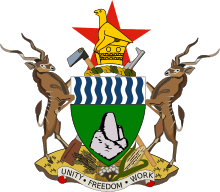Rozwi Empire
| Rozvi Empire | ||||||||||||
| Rozvi | ||||||||||||
| Kingdom | ||||||||||||
| ||||||||||||
| Capital | Danamombe | |||||||||||
| Languages | Kalanga-Rozwi | |||||||||||
| Religion | Belief in Mwari | |||||||||||
| Government | Monarchy | |||||||||||
| Changamire | ||||||||||||
| • | c. 1660 – c. 1695 | Changamire Dombo(first) | ||||||||||
| • | 1831–1866 | Changamire Tohwechipi (last) | ||||||||||
| History | ||||||||||||
| • | Rozvi conquest of Butua | 1660 | ||||||||||
| • | Ndebele conquest of Rozvi | 1866 | ||||||||||
| Area | ||||||||||||
| • | 1700[1] | 624,000 km² (240,928 sq mi) | ||||||||||
| Population | ||||||||||||
| • | 1700[2] est. | 1,000,000 | ||||||||||
| Density | 1.6 /km² (4.2 /sq mi) | |||||||||||
| ||||||||||||
Part of a series on the |
||||||||||||||||||||||||||||||||||||||||
|---|---|---|---|---|---|---|---|---|---|---|---|---|---|---|---|---|---|---|---|---|---|---|---|---|---|---|---|---|---|---|---|---|---|---|---|---|---|---|---|---|
| History of Zimbabwe | ||||||||||||||||||||||||||||||||||||||||
 | ||||||||||||||||||||||||||||||||||||||||
|
||||||||||||||||||||||||||||||||||||||||
|
||||||||||||||||||||||||||||||||||||||||
|
| ||||||||||||||||||||||||||||||||||||||||
The Rozvi Empire (1684–1834) was established on the Zimbabwean Plateau by Changamire Dombo. After the death of Changamire Dombo. His successor adopted title Mambo.
History
In 1693, Portuguese militia tried to take control of the gold trade in the interior of Africa by invading the Rozvi empire. The Rozwi were able to successfully defeat these attacks and maintain their control of the gold mines until their empire collapsed. The Rozvi were led by Changamire Dombo,[3] whose power was based in Butua in the southwest of Africa. The Rozwi were formed from several Shona states that dominated the plateau of present-day Zimbabwe at the time. They drove the Portuguese off the central plateau, and the Europeans retained only a nominal presence at one of the fairs in the eastern highlands.
Changamire brought the whole of present-day Zimbabwe under his control, forming a polity that became known as the Rozwi Empire. This powerful kingdom of warriors was to be known as the Rozvi or baLozwi people.[4] They established their capital at Danamombe, also known as Dhlo-Dhlo (the Ndebele name).
Many sources see the Rozvi not as a recovering segment of the Mutapa people, but in fact a people in its own right emerging under the wing of the Mutapa (compare the rise of the Khumalo from under the Zulu nation). The administrative power of the Mutapa began to fall to control the whole empire, and tributaries began to exert more independence.
A leader of the people of guruuswa, given the title Changamire and known as Dombo, became independent from the Mutapa. When the Portuguese tried to colonise, Changamire Dombo led rebellions against their rule. The area of the Rozwi empire fluctuated. Its influence extended over much of present-day Zimbabwe, westward into Botswana, and southward into northeastern South Africa.
Many tales identify Dombo ('Rock') as Chikura Wadyembeu. Modern scholars agree that this was a confusion with another leader of a different people.
Technology and economy
The Rozvi chiefs revived the tradition of building in stone and constructed impressive cities throughout the southwest. Polychrome pottery was also emblematic of its culture.[4]
The economic power of the Rozvi Empire was based on cattle wealth and farming, with significant gold mining. They established trade with Arab traders, in which materials such as gold, copper, and ivory were exchanged for luxury goods.
Records from the Portuguese have shown that the Rozvi were sophisticated military strategists. They were noted for using the cow-horn formation years before the great Zulu leader Shaka did in the 19th century. With spears, bows, and arrows, the aggressive Rozvi took over the plateau.[4]
See also
References
- ↑ Cornell, James. Lost Lands and Forgotten People Sterling Publishing Company, Incorporated, 1978, ISBN 978-0806939261 page 24
- ↑ Cornell, James. Lost Lands and Forgotten People Sterling Publishing Company, Incorporated, 1978, ISBN 978-0806939261 page 24
- ↑ Isichei, Elizabeth Allo, A History of African Societies to 1870 Cambridge University Press, 1997, ISBN 978-0521455992 page 435
- 1 2 3 "Rozwi". Encyclopædia Britannica. Retrieved 2007-05-09.